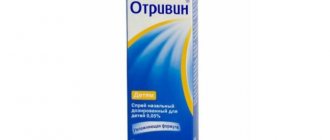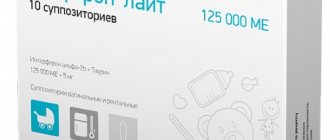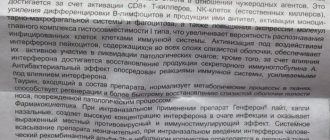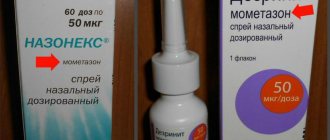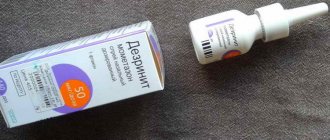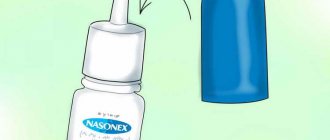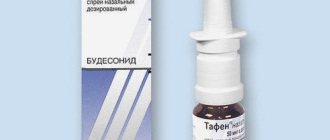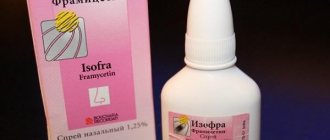Composition of Tizin
The composition of Tizin nasal drops differs in the concentration of the active drug compound, depending on the type of drug.
In 1 ml. nasal drops (concentration 0.1%) contains 1 mg. xylometazoline hydrochloride , and in addition, such auxiliary components as: perfume oil, benzalkonium chloride, benzyl alcohol, disodium edetate, hydrochloric acid, sodium citrate, sorbitol, polyoxyethylene glycerol trihydroxystearate 40, water, sorbitol and methylhydroxypropylcellulose.
In 1 ml. Children's Tizin (concentration 0.05%) also contains 1 mg. medicinal compound and auxiliary components similar to the form of the drug described above.
special instructions
Long-term use (more than 7 days) and overdose of sympathomimetics that have a decongestive effect can lead to reactive hyperemia of the nasal mucosa. As a result, difficulty in nasal breathing occurs, which leads to the patient starting to use the drug repeatedly or even constantly. This can lead to chronic swelling (medicinal rhinitis), and eventually even to atrophy of the nasal mucosa (ozena).
In milder cases, to improve the patient's condition, you can first stop injecting the sympathomimetic into one nostril, and after the complaints have subsided, continue to inject it into the other nostril to at least partially ensure nasal breathing.
Do not exceed recommended doses, especially in children and the elderly.
It is not recommended to use the drug continuously for more than 7 days. If the medicine has become unusable or has expired, do not throw it into wastewater or onto the street! Place the medication in a bag and place it in the trash. These measures will help protect the environment!
Indications for use
This drug is indicated for use for sinusitis, rhinitis, pharyngitis , as well as hay fever . In addition, Tizin nasal drops are used as a preparatory agent before diagnostic or therapeutic procedures to eliminate swelling of the mucous tissues of the nasal passages and nasopharynx.
Pharmacological properties of the drug Tizin
Pharmacodynamics. Tetrizoline hydrochloride is a sympathomimetic that stimulates α-adrenergic receptors of the sympathetic nervous system and has virtually no effect on β-adrenergic receptors. When applied to the mucous membrane of the nasal cavity as a sympathomimetic amine, it has a vasoconstrictor and anti-edema effect, leading to a narrowing of small arterioles, a decrease in swelling of the mucous membrane of the nasal passages and a decrease in secretion. Pharmacokinetics. The vasoconstrictor effect of tetrizoline and the reduction in swelling of the nasal mucosa under its influence begins approximately 1 minute after application and lasts for 4–8 hours. When applied topically in recommended doses, tetrizoline is practically not absorbed from the mucous membrane, but the possibility of systemic absorption in patients cannot be ruled out with damage to the epithelium of the mucous membrane.
Contraindications for Tizin
Contraindications to the use of the drug are angle-closure glaucoma , dry rhinitis , and hypersensitivity . It is worth remembering that there are age restrictions on these nasal drops. For the treatment of children under 2 years of age, the drug should not be used, the concentration of the active compound in which reaches 0.05%. For patients under 6 years of age, the “adult” form of Tizin is contraindicated, i.e. drops 0.1%.
This drug should be used with extreme caution in the treatment of patients suffering from diseases such as: ischemic heart disease, hypertension, aneurysm, arrhythmia, pheochromocytoma, diabetes, hyperthyroidism and some other cardiovascular and metabolic disorders .
Side effects of the drug Tizin
Reactive hyperemia and swelling of the mucous membrane, burning sensation or dryness of the mucous membrane, chronic swelling during long-term therapy. Sometimes systemic side effects are observed (tachycardia, headache, tremor, general weakness, sweating, increased blood pressure). Frequent use of the drug in high doses can cause a burning sensation and dryness in the nasal cavity, as well as the development of drug-induced rhinitis. Long-term use of imidazole derivatives can cause damage to the epithelium of the nasal cavity with the development of dry rhinitis.
Instructions for use of Tizin (Method and dosage)
According to the instructions for Tizin, nasal drops are used intranasally, i.e. instilled into the nasal passages with the head slightly tilted back. For adult patients and children over the age of 6 years, it is recommended to instill 2 or 4 drops of the drug, with a concentration of 0.1%, into each nostril.
Children's Tizin, with a concentration of 0.05%, is used in the treatment of children aged 2 to 6 years in a dosage equal to 2-3 drops. During pregnancy , Tizin is used if the expected benefit is significantly greater than the harm. Nasal drops should be used no more than once every 4 hours.
As a rule, the drug has a long-lasting effect, so it is enough to use it infrequently. It should be remembered that the maximum duration of treatment with the drug should not exceed 5 days for adult patients and 3 days for children. Although the use of drops before bed is considered an effective measure for eliminating nasal congestion throughout the night, the drug can cause insomnia because it affects the human nervous system.
A second course of treatment with Tizin can be prescribed several days after the previous therapeutic treatment.
Tizin classic 0.05% 10ml dosed nasal spray
pharmachologic effect
Anticongestive, alpha-adrenomimetic.
Composition and release form Tizin classic 0.05% 10ml dosed nasal spray
Dosed nasal spray – 1 ml:
- active substance: xylometazoline hydrochloride - 0.5 mg/1 mg; the amount of active substance in one dose for 0.05% - 0.035 mg, for 0.1% - 0.14 mg;
- excipients: benzalkonium chloride; disodium edetate; sodium chloride; sodium dihydrogen phosphate dihydrate; disodium hydrogen phosphate dihydrate; sorbitol; purified water.
10 ml in brown hydrolytic glass bottles (class III) with a dosing device and a PE pull-off screw cap; 1 bottle in a cardboard pack.
The number of doses in a bottle for a 0.05% solution is at least 140, for a 0.1% solution - at least 70.
Description of the dosage form
A transparent, colorless, odorless solution or with a weak characteristic odor.
Directions for use and doses
Intranasally.
Children aged 2–6 years
Unless otherwise prescribed, one dose of Tizin Xylo in the form of a 0.05% nasal spray dosed into each nasal passage 1-2 times a day.
Adults and school-age children (over 6 years old)
3 times a day, one dose of the drug Tizin Xylo is administered in the form of a 0.1% nasal spray dosed into each nostril. The dose depends on the individual sensitivity of the patient and the clinical effect.
Xylometazoline nasal metered spray should not be used for more than 5–7 days, unless your doctor recommends a different duration of treatment.
After completion of therapy, the drug can be re-administered only after a few days.
You should always consult your doctor regarding the duration of use in children.
General recommendations for administration
Remove the protective cap. Before first use, press the spray nozzle several times until a uniform cloud of “fog” appears. The bottle is ready for further use. When using, press once. Inhale the drug through the nose. If possible, keep the spray bottle vertical. Do not spray horizontally or downwards. After use, close the bottle with a cap.
Pharmacodynamics
Xylometazoline (imidazole derivative) is a sympathomimetic drug with alpha-adrenergic activity. It has a vasoconstrictor effect and reduces swelling of the mucous membrane.
The action usually begins within 5–10 minutes. The drug facilitates nasal breathing by reducing swelling and hyperemia of the mucous membrane, and also improves the discharge of secretions.
Pharmacokinetics
When applied topically, it is practically not absorbed; plasma concentrations are so small that they cannot be determined by modern analytical methods.
Indications for use Tizin classic 0.05% 10ml dosed nasal spray
- reduction of swelling of the mucous membrane of the nasopharynx and discharge in acute allergic rhinitis, acute respiratory infections with symptoms of rhinitis, sinusitis, hay fever, otitis media;
- preparing the patient for diagnostic manipulations in the nasal passages.
Contraindications
- hypersensitivity;
- simultaneous use of MAO inhibitors or other drugs that can cause an increase in blood pressure;
- arterial hypertension;
- tachycardia;
- severe atherosclerosis;
- glaucoma;
- atrophic rhinitis;
- history of surgical interventions on the meninges;
- children's age (up to 6 years - for a dosage of 0.1%, up to 2 years - for a dosage of 0.05%).
With caution: ischemic heart disease (angina), prostatic hyperplasia, thyrotoxicosis, diabetes mellitus, pheochromocytoma.
Application of Tizin classic 0.05% 10ml dosed nasal spray during pregnancy and breastfeeding
Xylometazoline should not be used during pregnancy, because The effects of this drug on the fetus have not been adequately studied. The drug should not be used during breastfeeding, because it is unknown whether the active substance is excreted in breast milk or not.
special instructions
Long-term use and overdose of sympathomimetics that have a decongestant effect can lead to reactive hyperemia of the nasal mucosa. The rebound phenomenon can cause airway obstruction, which leads to the patient using the drug repeatedly or even continuously. This can lead to chronic swelling (medicinal rhinitis), and eventually even to atrophy of the nasal mucosa (ozena).
In the case of chronic rhinitis, the drug Tizin Xylo 0.05 and 0.1% can only be used under the supervision of a physician, taking into account the risk of atrophy of the nasal mucosa.
Tizin Xylo should not be used if you have hypersensitivity to benzalkonium chloride, which is included in the drug as a preservative.
Impact on the ability to drive a car and use equipment
With long-term treatment or use of the drug Tizin Xylo in higher doses, the possibility of its systemic effect on the cardiovascular system cannot be excluded, which may impair the ability to drive and use equipment.
Overdose
Symptoms: overdose or accidental ingestion of the drug can lead to the following symptoms - dilated pupils, nausea, vomiting, cyanosis, fever, cramps, tachycardia, cardiac arrhythmias, collapse, cardiac arrest, hypertension, pulmonary edema, respiratory failure, mental disorders. In addition, suppression of central nervous system function may occur, accompanied by drowsiness, decreased body temperature, bradycardia, shock-like hypotension, apnea and coma.
Treatment: the use of activated carbon, gastric lavage, artificial respiration with the introduction of oxygen. To lower blood pressure, use phentolamine 5 mg in saline solution intravenously slowly or 100 mg orally.
Vasopressor drugs are contraindicated. If necessary, antipyretic and anticonvulsant drugs are used.
Side effects Tizin classic 0.05% 10ml dosed nasal spray
Tizin Xylo may cause transient mild nasal irritation (burning), paresthesia, sneezing and hypersecretion in susceptible individuals.
In some cases, after using the drug, increased swelling of the nasal mucosa (reactive hyperemia) may be observed.
Long-term or frequent use of xylometazoline or its use in high doses can lead to a burning sensation in the nose or dry mucous membrane, as well as reactive congestion with the development of drug-induced rhinitis. This effect can be observed even 5-7 days after completion of treatment, and with prolonged use it can cause irreversible damage to the mucous membrane with the formation of crusts (rhinitis sicca).
In very rare cases, headache, insomnia or fatigue, and depression may occur (with long-term use in high doses).
In isolated cases, local intranasal use of sympathomimetics may be accompanied by systemic effects, such as palpitations, tachycardia, arrhythmias, increased blood pressure, and blurred vision.
Drug interactions
Concomitant use of MAO inhibitors such as tranylcypromine or tricyclic antidepressants may lead to an increase in blood pressure due to the cardiovascular effects of these substances.
Tizin's analogs
Level 4 ATX code matches:
Xymelin Eco
Xymelin
Nazivin
Galazolin
Lazorin
Nazivin Sensitive for children
Otrivin
Naphthyzin
Sanorin
Knoxprey
For the nose
Lazolvan Rino
Afrin
Rhinorus
Eucazoline Aqua
Rinazolin
Grippostad Reno
Farmazolin
Xylometazoline
Nazol Advance
The main analogues of Tizin nasal drops include Vizin, Montevisin, Tetrizoline, VizOptic, Berberyl , and Octilia .
Tizin during pregnancy and lactation
Many women wonder whether Tizin can be used as nasal drops pregnancy and breastfeeding In accordance with the instructions, the drug can be used by pregnant and nursing mothers only if the expected benefit is significantly higher than the possible harm.
Many believe that children's Tizin can be used without fear during pregnancy and lactation, but this is not the case, since when using both forms of the drug, life-threatening vasoconstrictor side effects can occur for both the mother and the child.
Tizin price, where to buy
The price of Tizin depends, first of all, on the type of drug (for children or adults). The average price of Tizin nasal drops varies from 90 to 120 rubles.
The children's drug costs approximately 100-110 rubles.
- Online pharmacies in RussiaRussia
- Online pharmacies in UkraineUkraine
- Online pharmacies in KazakhstanKazakhstan
ZdravCity
- Tizin Classic nasal spray for runny nose, dosed 0.1%, bottle 10 ml Famar Orleans
100 rub. order - Tizin Expert nasal spray dosed 0.1% bottle 10 ml Famar Health Care Services Madrid, S.A.U.
186 RUR order
- Tizin Classic nasal spray dosed 0.05% bottle 10 ml Famar Orleans
86 rub. order
- Tizin Expert nasal spray dosed 0.05% bottle 10 ml Famar Health Care Services Madrid, S.A.U.
147 RUR order
Pharmacy Dialogue
- Tizin Expert (spray 0.1% 10ml)Famar Hels
177 RUR order
- Tizin Classic spray 0.1% 10mlFamar Hels
99 RUR order
show more
Pharmacy24
- Gengigel Tizing children's gel for baby teeth 20ml tube Ricerpfarma SRI, Italy
242 UAH.order
PaniPharmacy
- Gengigel Tizing 20ml, Raiserpharma
294 UAH order
show more
